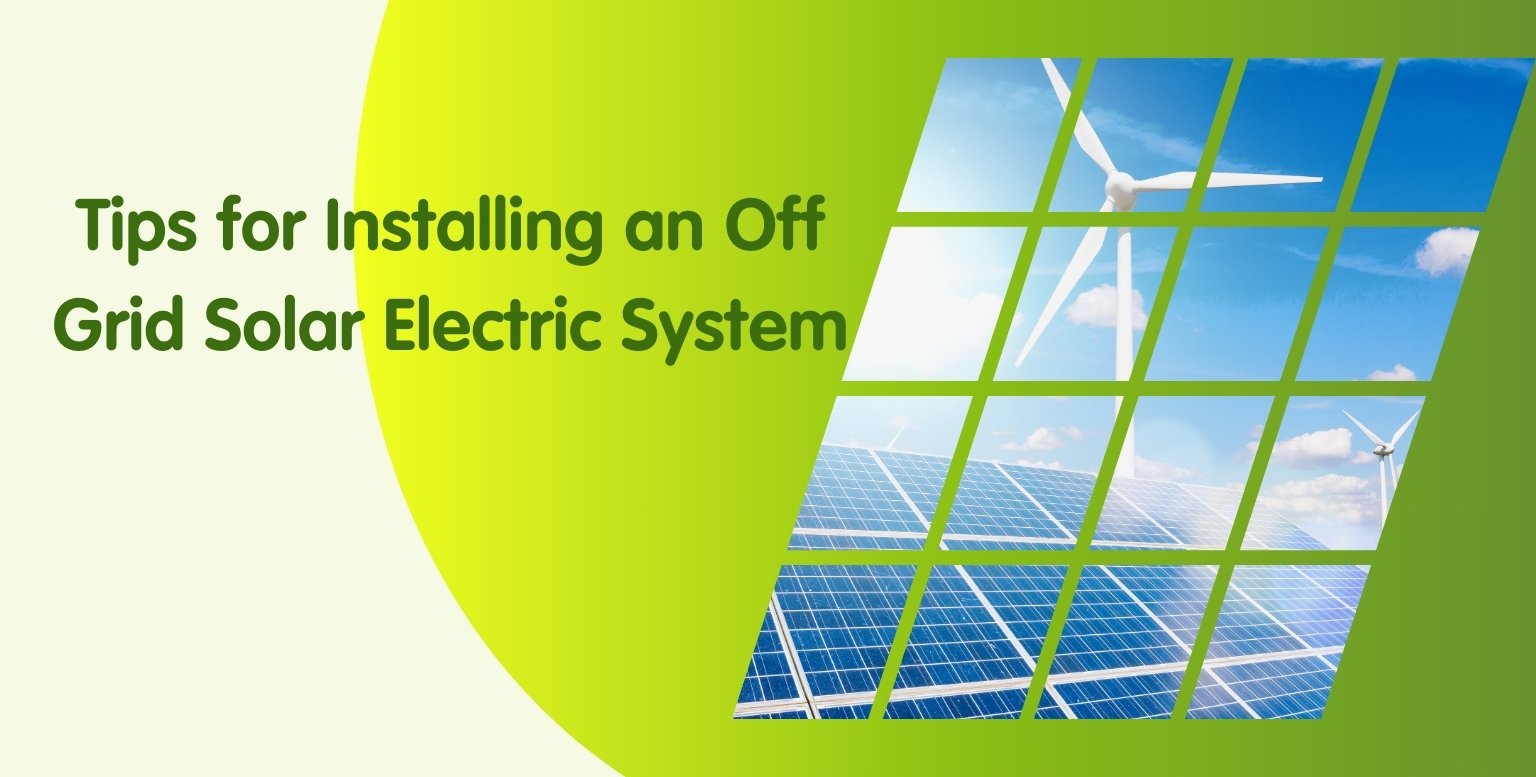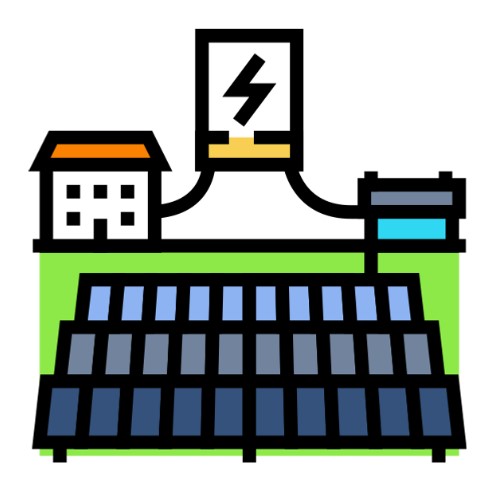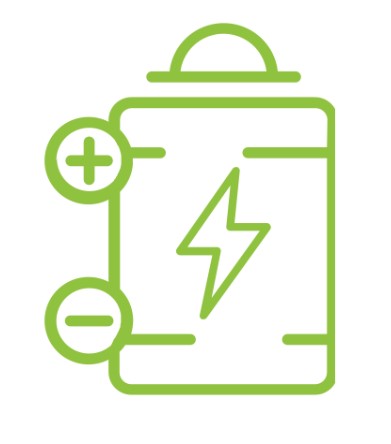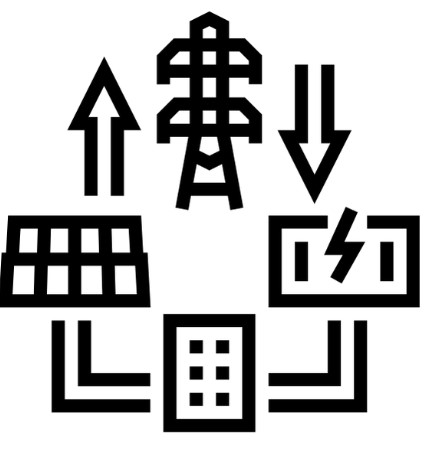Your basket is currently empty!
Written by
Installing an Off Grid Solar Electric System

Looking to power your home independently? An off grid solar electric system uses solar panels and batteries to generate and store energy, making it perfect for remote areas.
This article covers everything you need to know about installing and benefiting from these systems.
Key Takeaways
- Off-grid solar electric systems provide energy autonomy by utilising solar panels and battery storage, allowing users to operate independently from the national grid.
- Key components such as high-efficiency solar panels, robust battery storage, charge controllers, and inverters are crucial for ensuring reliability and continuous power supply.
- The benefits of off-grid systems include significant cost savings, reduced reliance on fossil fuels, and availability of government incentives, making them an attractive option for sustainable energy solutions.
Understanding Off Grid Solar Electric Systems

An off-grid solar system is a self-sufficient power source that utilises solar panels and batteries to generate and store solar energy.
Unlike grid-tied systems, which rely on the national grid for backup power, off-grid systems operate independently, providing energy autonomy for users.
These systems are particularly beneficial for those living in remote areas where grid power is unreliable or non-existent.
A typical off-grid solar system includes solar panels, a battery storage system, a charge controller, and an inverter.
Together, these components work to capture, store, and convert solar energy into usable electricity for your home or business.
This setup ensures a continuous power supply, even when solar panels are not actively generating electricity.
Key Components of Off Grid Solar Systems
The heart of any off-grid solar system is its solar panels, which capture sunlight and convert it into electricity.
High-efficiency black solar panels, such as those made by JA Solar and Jinko, are commonly used due to their durability and effectiveness in converting sunlight into energy.
These panels have a long lifespan, ensuring that your off-grid system remains reliable over time.
Another crucial component is the battery storage system, which stores excess electricity generated by the solar panels for use during periods of low sunlight.
The Pylontech US5000 battery, for instance, offers 4.8 kWh of storage capacity, providing a robust solution for energy storage in large off-grid systems.
A pure sine wave inverter is also essential, as it converts the direct current (DC) produced by the solar panels into alternating current (AC), which is used by household appliances.
Charge controllers are vital for managing the flow of electricity from the solar panels to the batteries, preventing overcharging and ensuring system longevity.
Hand-selected components, including charge controllers, ensure maximum power generation and reliability in off-grid solar systems.
How Off Grid Solar Systems Work

Off-grid solar systems harness sunlight through photovoltaic (PV) panels, which convert solar energy into electricity.
This electricity is then stored in battery systems for use when sunlight is not available.
Unlike grid-tied systems, off-grid systems are not connected to the national grid, making them truly independent power sources.
When the solar panels produce more energy than needed, the excess is stored in batteries.
During periods when the solar panels cannot generate enough electricity, such as at night or during cloudy weather, the system draws power from these stored reserves.
This setup ensures a reliable power supply and allows for complete energy independence.
Who Benefits from Off Grid Solar Systems?
Off-grid solar systems offer a perfect solution for homeowners seeking energy independence and self-sufficiency.
With the rise of off-grid living, approximately 150,000 households in the UK have adopted this lifestyle, emphasising the growing desire for autonomy from traditional power grids.
These systems are particularly beneficial for those in remote areas where grid power is either unreliable or non-existent.
Moreover, off-grid solar systems are ideal for various applications, from holiday homes and campsites to caravan homes and cabins.
They provide a reliable and sustainable power source for those seeking to reduce their environmental impact and enjoy the benefits of renewable energy.
Ideal Locations for Off Grid Systems
Remote areas and rural properties are prime candidates for off-grid solar installations.
These locations often lack reliable electricity grid access, making off-grid systems a practical and sustainable solution for energy needs.
Off Grid Systems for Different Applications
Off-grid solar systems are versatile and can be used in various settings, including holiday homes, campsites, and even larger community projects.
These systems support a range of electronic devices, from lighting and appliances to RVs and boats, making them suitable for different applications and enhancing energy resilience.
Advantages of Off Grid Solar Electric Systems

The advantages of off-grid solar electric systems are numerous, ranging from energy independence to significant cost savings and environmental benefits.
Generating their own electricity allows users to reduce or eliminate reliance on traditional power grids, providing full control over their energy supply.
This independence not only provides stability in budgeting but also insulates users from rising energy costs and fluctuations in energy prices.
Financially, off-grid solar systems offer substantial long-term savings. By eliminating electricity bills, users can achieve significant cost reductions over time.
Additionally, off-grid systems are typically simpler and cheaper to install than hybrid systems, making them a cost-effective solution for many households.
Environmentally, off-grid solar systems contribute to reducing carbon emissions and reliance on fossil fuels.
Promoting the use of renewable energy, these systems support sustainable living and help mitigate the environmental impact of traditional energy sources.
Energy Independence
Energy independence is a significant advantage of off-grid solar systems. These systems allow users to generate their own electricity, completely eliminating reliance on the grid.
This independence is particularly appealing in the face of rising energy costs and environmental concerns, providing users with stability in their energy expenses and reducing their carbon footprint.
Prioritising energy use during peak production times and implementing energy-efficient appliances can ensure that an off-grid system remains efficient and reliable throughout the year.
Cost Savings
One of the most compelling reasons to switch to an off-grid solar system is the potential for significant cost savings.
By generating their own electricity, users can completely eliminate electricity bills, resulting in zero energy costs.
This is particularly beneficial in today’s climate of rising energy prices, where household energy costs are expected to remain high.
In the long term, off-grid solar systems offer substantial financial benefits.
The initial investment in an off-grid system can lead to major savings over time, making these systems an economically sound choice for those looking to reduce their energy expenses.
Environmental Benefits
Off-grid solar systems provide significant environmental benefits by reducing reliance on fossil fuels and lowering carbon emissions.
By generating renewable energy, these systems contribute to a more sustainable way of living and help mitigate the negative environmental impacts of traditional power sources.
Moreover, off-grid solar systems promote energy efficiency and the use of natural resources, supporting a greener and more eco-friendly lifestyle.
This shift towards renewable energy not only benefits the environment but also aligns with global efforts to combat climate change and reduce environmental pollution.
Battery Storage in Off Grid Solar Systems
Battery storage is a critical component of off-grid solar systems, ensuring a continuous and reliable power supply.
By storing excess electricity generated by solar panels, batteries provide a backup power source during periods of low solar production, such as at night or during cloudy weather.
This capability is essential for maintaining energy independence and ensuring that the system can meet energy demands at all times.
Implementing a robust battery storage solution allows for effective energy management and enhances the overall reliability of the off-grid system.
Proper battery storage ensures that users can maximise their energy usage and maintain a stable power supply even during peak demand hours.
Types of Batteries
Several types of batteries are used in off-grid solar systems, each with its own advantages.
AGM deep cycle leisure batteries are commonly included in off-grid solar kits due to their reliability and ability to handle partial discharges, making them suitable for continuous energy storage.
Pylontech Lithium LFP batteries are also popular for off-grid living, known for their efficiency, durability, and rapid charge/discharge capabilities.
These batteries are particularly beneficial in off-grid applications due to their long lifespan and compatibility with various system components.
Enhancing Battery Efficiency
Enhancing battery efficiency requires high-quality materials and technologies. Tinned copper is preferred for battery cables in off-grid solar systems due to its corrosion resistance and superior conductivity.
Additionally, Pylontech Lithium LFP batteries offer rapid charge and discharge capabilities, making them ideal for efficient energy use in off-grid systems.
Regular maintenance and proper management of battery storage systems can further optimise performance and ensure long-term reliability.
Installing an Off Grid Solar Electric System
Installing an off-grid solar electric system involves several critical steps, from planning to execution. Starting with a comprehensive design service, wiring schematic, and a detailed manual is crucial to guide the installation process.
Many large off-grid solar systems come pre-assembled on a heavy-duty backing board, simplifying setup and reducing installation time.
Continuous technical support is also available to assist users during the installation process, ensuring that all components are correctly connected and functioning.
Key components like battery fusing and AC/DC isolators are crucial for setting up a secure and efficient energy system.
Planning Your Off Grid System
Accurate planning is vital for the success of an off-grid solar system. The first step involves calculating your energy needs by listing all appliances and their usage hours to determine total watt-hour requirements.
This calculation helps in designing a system that can meet your energy demands efficiently.
Proper planning also includes selecting the right components, such as solar panels, batteries, and inverters, to ensure that your system is capable of providing a reliable power supply.
By considering your energy needs and the specific requirements of your location, you can design an off-grid system that is both effective and sustainable.
Installation Process
The installation process for an off-grid solar system involves several key steps, beginning with the proper mounting of the solar panels.
The panels should be installed in an unobstructed area to maximise sunlight exposure and, consequently, power generation.
Once the panels are in place, the charge controller should be connected to the battery first to ensure proper calibration and system functionality.
Following this, the inverter and other components can be connected, completing the installation process.
Maintenance Tips
Regular maintenance is crucial for the longevity and efficiency of an off-grid solar system.
This includes checking connections and ensuring that the solar panels are clean and free of debris, which can hinder performance.
Regular weather assessments can also help plan energy usage strategies during periods of low sunlight.
Keeping the system well-maintained prevents energy loss and extends the lifespan of the solar setup.
Comparing Off Grid and Hybrid Solar Systems
When deciding between an off-grid and a hybrid solar system, it’s essential to understand their key differences:
- Off-grid systems operate independently of the national grid, providing complete energy autonomy.
- Hybrid systems can draw power from both solar energy and the grid, offering greater flexibility.
- Hybrid systems can import electricity when solar production is low and export excess energy back to the grid, potentially generating income.
However, off-grid systems eliminate the need for costly and time-consuming applications to the Distribution Network Officer, making them simpler and often cheaper to install.
They also avoid the high energy costs associated with the national grid, though they require robust battery storage or backup generators to ensure a reliable power supply during periods of low solar production.
Off Grid vs Hybrid: Key Differences
Off-grid systems and hybrid systems each have their unique advantages. Off-grid systems provide complete independence from the power grid, which can be particularly beneficial in remote areas or for those seeking total energy autonomy.
Hybrid systems, on the other hand, offer a balance of stored and imported energy, making them suitable for locations with reliable grid access but where energy independence is still desired.
The choice between the two often comes down to individual needs and circumstances.
Off-grid systems are ideal for those who want to avoid high energy costs and the environmental impact of fossil fuels.
Hybrid systems offer more flexibility and can be more cost-effective in areas with reliable grid access.
Choosing the Right System
Selecting the right system depends on several factors, including location, budget, energy requirements, and grid reliability.
Off-grid systems typically have higher upfront costs but offer long-term savings and energy independence.
Hybrid systems, while potentially less expensive upfront, may incur ongoing costs associated with grid connection and electricity usage.
Future expansion plans can also influence the decision. Hybrid systems offer greater scalability and flexibility, making them a good choice for those who anticipate increasing their energy needs over time.
Ultimately, the right system is one that aligns with your specific energy goals and financial considerations.
Common Challenges and Solutions in Off Grid Systems
While off-grid solar systems offer numerous benefits, they also come with challenges.
Effective energy management is crucial to ensure that the system can meet energy demands, especially during periods of low solar production.
Implementing energy-efficient appliances and monitoring tools can help optimise electricity usage and maintain a stable power supply.
Weather variability is another significant challenge. Prolonged cloudy or rainy periods can reduce solar energy production, necessitating a robust battery storage system to store excess energy produced on sunny days.
Regular maintenance and monitoring of the system are essential for sustaining performance and extending the lifespan of components.
Managing Energy Consumption
Managing energy consumption effectively is a key aspect of living off-grid. Users should monitor their energy use and prioritise essential appliances to ensure sufficient power during low production times.
Installing energy-efficient devices can significantly reduce overall consumption and help maintain power availability.
Backup generators are also a useful addition to off-grid systems, providing an alternative power source during periods of low solar production.
By combining efficient energy management practices with a reliable backup plan, users can optimise their off-grid living experience.
Dealing with Weather Variability
Dealing with weather variability requires a well-designed energy management system that can prioritise the use of stored solar energy first, ensuring there is enough energy to minimise the need to draw from the grid.
Having a sufficient battery storage system ensures that energy supply remains stable despite lower solar production during cloudy or rainy days.
Government Policies and Incentives
Government support plays a crucial role in promoting the adoption of off-grid solar systems.
Various grants, tax credits, and rebates are available to assist homeowners and businesses in financing their installations.
These incentives make it more affordable to switch to renewable energy, accelerating the transition to sustainable practices.
Policies such as the 0% VAT rate on solar panel installations and the ECO4 scheme provide significant financial benefits, making it easier for individuals to invest in off-grid systems.
The Home Upgrade Grant offers further support for energy-efficient improvements, ensuring that more households can access renewable energy solutions.
Available Incentives
Several incentives are currently available to support the adoption of off-grid solar systems. Homeowners can benefit from a 0% VAT rate on solar panel installations until March 2027, resulting in significant cost savings.
The ECO4 scheme provides funding for free or reduced-cost solar panels for low-income households until March 2026, making renewable energy accessible to more people.
The Home Upgrade Grant can offer up to £10,000 for energy-efficient improvements, including solar panel installations.
These incentives, combined with potential future changes in government policies, make it an excellent time to invest in off-grid solar systems.
Future Outlook
The future outlook for off-grid solar systems in the UK is promising, with the government setting ambitious targets for decarbonising the power sector by 2035.
Upcoming policies will play a crucial role in shaping the adoption of off-grid systems, potentially leading to increased incentives and broader support for renewable energy solutions.
Case Studies of Successful Off Grid Installations
Real-life examples of successful off-grid installations highlight the benefits and feasibility of these systems.
One notable case study involves an off-grid installation in a remote UK location, which demonstrated significant energy savings and a reduced environmental impact.
These projects showcase the potential of off-grid systems to provide reliable and sustainable energy solutions.
Such success stories serve as inspiration and practical examples for those considering off-grid living.
They emphasize the importance of proper planning, quality components, and regular maintenance in achieving energy independence and sustainability.
Residential Projects
A residential project in Devon successfully implemented an off-grid solar system, allowing the homeowners to achieve complete energy independence.
This project highlights the financial and environmental benefits of off-grid systems, demonstrating their effectiveness in reducing electricity costs and promoting sustainable living.
Commercial and Community Projects
Commercial and community projects are increasingly adopting off-grid solar installations to enhance energy sustainability.
A community project in the UK utilised a large-scale off-grid solar system, reducing reliance on traditional energy sources and providing power for local initiatives.
These projects not only meet energy demands but also engage and empower local communities.
Summary
Off-grid solar electric systems offer a range of benefits, from energy independence and cost savings to significant environmental advantages.
By understanding the key components, how they work, and the installation process, you can successfully transition to an off-grid lifestyle.
The comprehensive steps outlined in this guide provide a clear path toward achieving energy autonomy and sustainability.
As you consider making the switch to an off-grid solar system, remember that proper planning, quality components, and regular maintenance are crucial for long-term success.
Embrace the potential of renewable energy and take control of your energy future. The journey to energy independence is not only feasible but also incredibly rewarding.
Frequently Asked Questions
How many solar panels do I need to go off the grid in the UK?
To go off the grid in the UK, you will need approximately 4 to 16 solar panels, depending on the size of your home.
Specifically, a 1-2 bedroom house may require 4 to 8 panels, while a larger 4-5 bedroom house may need 13 to 16 panels for sufficient energy capacity.
What is the drawback of off-grid system in solar electric power?
The primary drawback of an off-grid solar electric system is its significantly higher cost due to the need for larger storage solutions, additional solar panels, a more powerful inverter, and sometimes a generator.
This investment can be roughly double that of a grid-tied system.
How much is a 5kW solar system with battery in the UK?
A 5kW solar system with battery installation in the UK typically costs between £9,000 and £10,000, influenced by factors such as the battery size and coupling type.
What size solar system do I need to go off-grid?
To go off-grid, an average three-bedroom home typically requires approximately 4.4 kW of solar panel output, while a smaller energy-efficient building may need about 2.2 kW.
The specific requirements can vary based on individual circumstances and energy consumption.
What are the main components of an off-grid solar system?
The main components of an off-grid solar system are solar panels, a battery storage system, a charge controller, and an inverter.
These elements work in unison to capture, store, and convert solar energy into usable electricity.
Written by
Start Your Solar PANEL Project Today
Buy 1 get 1 FREE Solar Panels With Installation!
Solar Finance Options & Price Match Too!
What is in this article?
- Key Takeaways
- Understanding Off Grid Solar Electric Systems
- Who Benefits from Off Grid Solar Systems?
- Advantages of Off Grid Solar Electric Systems
- Battery Storage in Off Grid Solar Systems
- Installing an Off Grid Solar Electric System
- Comparing Off Grid and Hybrid Solar Systems
- Common Challenges and Solutions in Off Grid Systems
- Government Policies and Incentives
- Case Studies of Successful Off Grid Installations
- Summary
- Frequently Asked Questions





